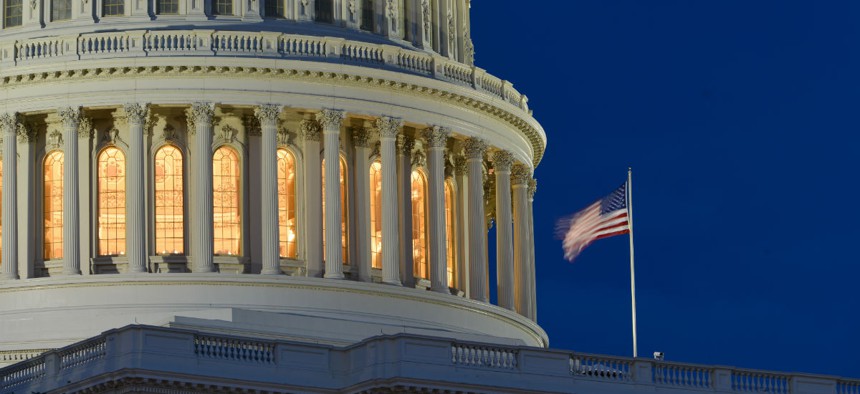Congress Removes Some Roadblocks, But Path to Avoiding a Shutdown Still Unclear
Lawmakers were still sorting out their next steps just two days before the spending deadline.
Congressional Republicans on Wednesday appeared to clear some obstacles to keeping federal agencies open past Friday, but still have no immediate path forward just two days before the government would shut down.
Tensions between the House and Senate were eased somewhat when senators pushing to fund subsidies to stabilize health insurance markets backed off their demands to approve the provision before the new year. Instead, Sens. Susan Collins, R-Maine, who asked for the vote as part of a funding measure, and Lamar Alexander, R-Tenn., who co-authored the health care bill, said they asked Senate leadership to delay the measure until 2018.
“Rather than considering a broad year-end funding agreement as we expected, it has become clear that Congress will only be able to pass another short-term extension to prevent a government shutdown and to continue a few essential programs,” the senators said in a joint statement. Instead, they will attempt to attach their proposal—which became an issue when President Trump announced in October he would no longer make the cost-sharing reduction payments the federal government had provided to health insurance companies to offset the cost of covering low-income customers—to a forthcoming omnibus spending bill Congress will take up in January at the earliest.
House conservatives had vowed not to pass the next continuing resolution with the health care language attached, setting up a potential funding showdown. While the Senate punting on the issue solves one outstanding problem, several still remain. Congress is looking to address children’s health insurance and disaster relief spending, as well as additional funding for certain agencies such as the departments of Defense and Veterans Affairs.
House Majority Leader Kevin McCarthy, R-Calif., told reporters that appropriators would put out a continuing resolution at some point Wednesday. House Republicans were scheduled to meet early Wednesday evening to discuss their strategy moving forward upon returning from the White House to celebrate the passage of their tax reform bill. Republican leadership had initially planned to fund the Defense Department for all of fiscal 2018 while keeping the rest of government afloat on a stopgap basis, but since abandoned that proposal. Lawmakers are now looking to fund all of government at fiscal 2017 levels into the third week of January.
Lawmakers made clear on Wednesday many details had not yet been sorted out.
Sen. Johnny Isakson, R-Ga., who chairs the Senate Veterans' Affairs Committee and has been a staunch advocate for the Veterans Choice Program that enables VA patients to receive private care on the department’s dime, said he was not sure how Congress would proceed with the matter. VA Secretary David Shulkin said in a letter to Isakson earlier this month that the choice program would run out of funding in three to five weeks.
“Maybe, maybe not,” Isakson said when asked if the additional funding would be included as part of a forthcoming CR. “That’s above my pay grade.”
Sen. John Kennedy, R-La., was equally uncertain of how the process will proceed, despite the end-of-Friday deadline.
“It’s all on the table,” Kennedy said when asked about the details of the forthcoming CR. “I don’t think anybody wants to shut the government down, but I’ll vote to do it if they put stuff in there I can’t swallow.”
Senate Minority Leader Chuck Schumer, D-N.Y., made clear issues remain on his side of the aisle as well. He said Democrats would not go along with Republican-backed “anomalies” to the CR to boost certain defense spending, saying it would break with their demand to equally raise spending caps set on defense and non-defense spending.
“We will not accept that one way or the other,” Schumer said. “We have said all along there has got to be parity.”
House Minority Leader Nancy Pelosi, D-Calif., warned that Democrats might withhold their votes from a spending measure.
"Unless we see a respect for our values and priorities," Pelosi wrote in a message to her fellow House Democrats Wednesday afternoon, "we continue to urge a strong NO on the continuing resolution."
This story has been updated to reflect a message from House Minority Leader Nancy Pelosi.
NEXT STORY: The Case for Moving Agencies Out of Washington








